Contributions to Philosophy
(Of the Event)
Studies in Continental Thought
EDITOR
JOHN SALLIS
CONSULTING EDITORS
Robert Bernasconi | William L. McBride |
Rudolf Bernet | J. N. Mohanty |
John D. Caputo | Mary Rawlinson |
David Carr | Tom Rockmore |
Edward S. Casey | Calvin O. Schrag |
Hubert L. Dreyfus | Reiner Schrmann |
Don Ihde | Charles E. Scott |
David Farrell Krell | Thomas Sheehan |
Lenore Langsdorf | Robert Sokolowski |
Alphonso Lingis | Bruce W. Wilshire |
David Wood
Martin Heidegger
Contributions to Philosophy
Of the Event)
Translated by
Richard Rojcewicz and Daniela Vallega-Neu
Indiana University Press
Bloomington and Indianapolis
This book is a publication of
Indiana University Press 601 North Morton Street Bloomington, Indiana 47404-3797 USA
iupress.indiana.edu
Telephone orders 800-842-6796
Fax orders 812-855-7931
Published in German as Martin Heidegger, Gesamtausgabe 65: Beitrge zur Philosophie (Vom Ereignis), edited by Friedrich-Wilhelm von Herrmann
1989 by Vittorio Klostermann, Frankfurt am Main English translation 2012 by Indiana University Press
All rights reserved
No part of this book may be reproduced or utilized in any form or by any means, electronic or mechanical, including photocopying and recording, or by any information storage and retrieval system, without permission in writing from the publisher. The Association of American University Presses Resolution on Permissions constitutes the only exception to this prohibition.
 The paper used in this publication meets the minimum requirements of the American National Standard for Information SciencesPermanence of Paper for Printed Library Materials, ANSI Z39.48-1992.
The paper used in this publication meets the minimum requirements of the American National Standard for Information SciencesPermanence of Paper for Printed Library Materials, ANSI Z39.48-1992.
Manufactured in the United States of America
Library of Congress Cataloging-in-Publication Data
Heidegger, Martin, 18891976 [Beitrge zur Philosophie. English] Contributions to philosophy (of the event) / Martin Heidegger ; translated by Richard Rojcewicz and Daniela Vallega-Neu. pages cm. (Studies in Continental thought) Translated from German. Includes bibliographical references. ISBN 978-0-253-00113-9 (cloth : alk. paper) ISBN 978-0-253-00127-6 (electronic book) 1. Philosophy. I Rojcewicz, Richard, translator. II. Vallega-Neu, Daniela, [date], translator. III. Title. IV. Title: Of the event.
B3279.H48B44513 2012
193dc23
2011047311
1 2 3 4 5 17 16 15 14 13 12
CONTENTS
Translators Introduction
This is a translation of Martin Heideggers Beitrge zur Philosophie (Vom Ereignis) dating from 193638. The German original appeared posthumously in 1989, with a second edition in 1994.
The book constitutes volume 65 of Heideggers Gesamtausgabe (Complete Edition) and inaugurates the third division of that series: Unpublished treatises: addressesponderings. At issue in the Contributions are indeed private ponderings not composed for publication. As such, the book displays the kind of literary unevenness that could be expected when thinkers write for themselves with no didactic intent: along with polished passages also a good number of incomplete sentences, ellipses, cryptic sections, and at times even loosely organized lists of keywords. As regards its sense, however, the book is the exact opposite of a private pondering. Right from the start, Heidegger denies that these are to be understood as his own personal contributions to philosophy. Instead, we have here a speaking of (understood primarily in the sense of the subjective genitive) the event (Ereignis). These ponderings attempt to let themselves be appropriated by the event. Thus what is here struggling to come to words arises out of a view of thinking that is radically different from the traditional, metaphysical understanding of thought as the generation of concepts out of the thinkers own spontaneity. That radical difference accounts for the struggle.
Our aim in translating was to capture in English the effect the original would have on a native speaker of German. Therefore, we did not attempt to resolve the grammatical peculiarities, nor have we imposed on Heideggers terminology the extraordinary sense which the ordinary words do eventually assume. In Heideggers understanding, Contributions to Philosophy sojourns in the transition to another beginning of thought with respect to metaphysics, the first beginning. This other beginning would require a transformation of language. Yet Heidegger recognizes (cf. section 259, p. 340) that transitional thinking must for some length of time still tread the paths of metaphysicsin other words, must still avail itself of the language of the first beginning. For Heidegger, the decisive junctures of the history of philosophy are marked not by the coining of new terms but by a new sense accruing to the old terms. Thus our translation aims to invite the reader into the task of disclosing the new sense and does not presumptuously impose that sense from the start through idiosyncratic terminological choices. For example, what essence and event come to mean in the course of these ponderings is up to the reader to decide.
The editor of this volume calls it Heideggers second magnum opus (after Being and Time). Its importance is unquestionable, but so is its challenge. The directionality is convoluted, the vocabulary purposefully archaic, the diction strange, and the style sui generis; language is here brought to the extremity of its possibilities. Yet our hope is that the reader of this translation will have the same chance of penetrating the book as would someone who takes up the original. For the convenience of those wishing to compare the two versions, the running heads herein indicate the Gesamtausgabe pagination.
We believe our terminology is intelligible in context, and we have kept to a minimum our interpolation of German words. At times, when an important nuance or semantic connection could not be captured, we have inserted the German terms in brackets. In particular, the force of the hyphen in Heideggers terms could often not be captured by simply hyphenating the corresponding English word, at least not without indicating the original. In the back of the volume we have provided extensive GermanEnglish and EnglishGerman glossaries. These not only lay out our translations of both hyphenated and non-hyphenated terms, they additionally serve as a sort of index to the main concepts of the book. To be found at the end are GreekEnglish and LatinEnglish glossaries as well. These include every word used here in those classical languages. For Greek terms, we have also placed a translation in the text upon the first occurrence of the word. Furthermore, the back matter contains a bibliography of all the other works of Heidegger cited by him in the present volume. This bibliography indicates published English translations, if extant.
We are indebted to several colleagues and friends who helped us resolve terminological issues and who offered incisive comments on delimited portions of the text: John Sallis, Dennis Schmidt, and David Krell. Bret Davis carefully read a draft of the entire text and suggested many improvements. Lastly, Daniela Vallega-Neu acknowledges with gratitude an NEH stipend for the summer of 2008, which allowed her to make substantial progress on the translation.



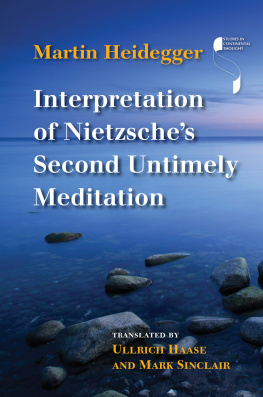


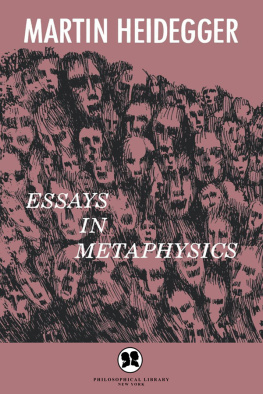
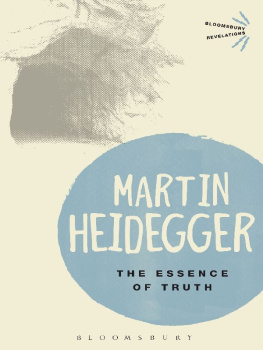
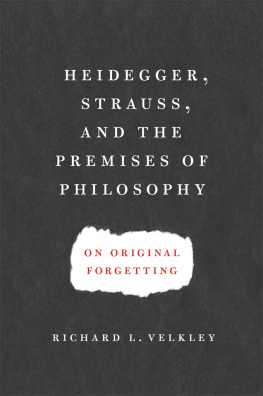

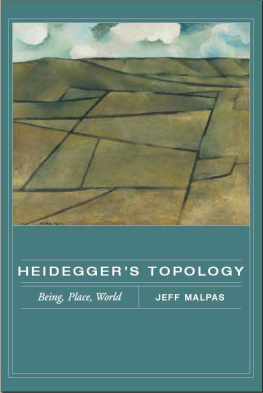
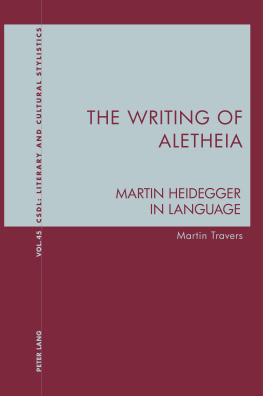

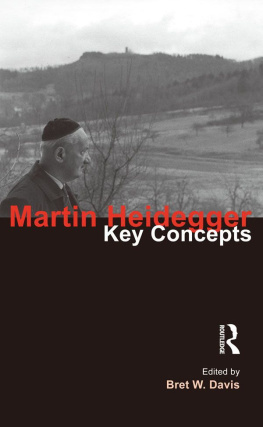
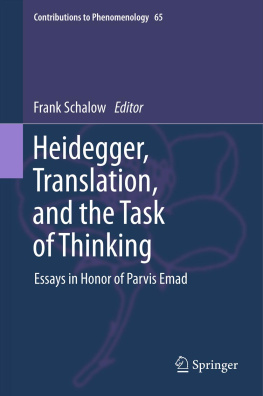

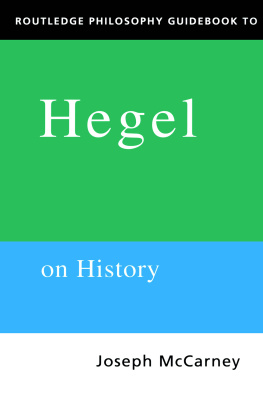

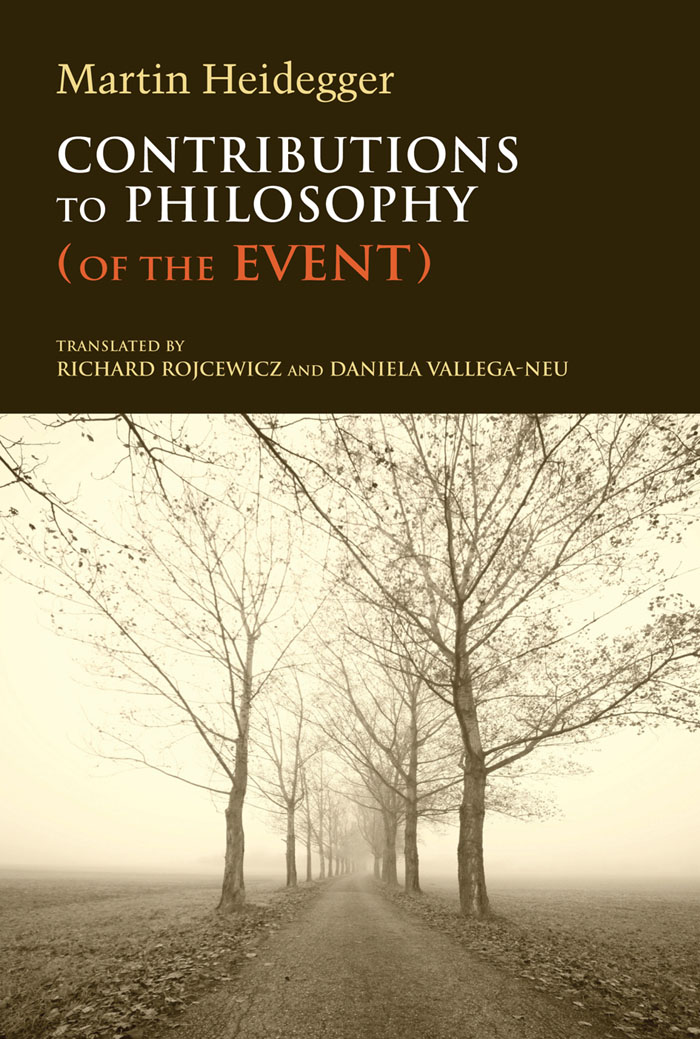
 The paper used in this publication meets the minimum requirements of the American National Standard for Information SciencesPermanence of Paper for Printed Library Materials, ANSI Z39.48-1992.
The paper used in this publication meets the minimum requirements of the American National Standard for Information SciencesPermanence of Paper for Printed Library Materials, ANSI Z39.48-1992.